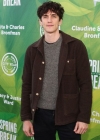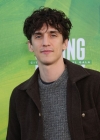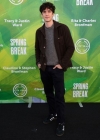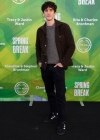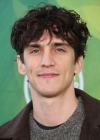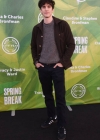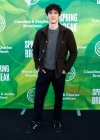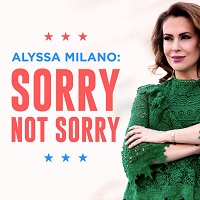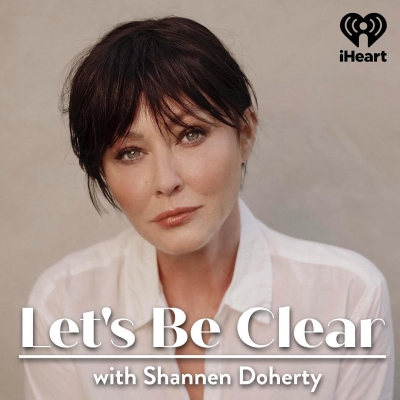
Madeleine heeft een interview gehad met Paper Magazine over ‘Charmed’, hiervoor is een outtakes gebruikt van een footoshoot met Rachell Smith waarvan eerder al een outtakes van verscheen in Teen Vogue.
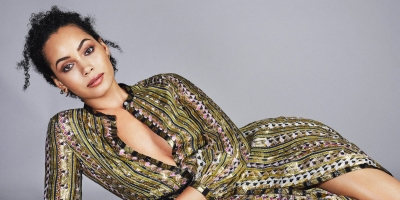
Galerij Links:
http//: 2018:Rachell Smith (Teen Vouge)
Feminism is mainstream, everyone’s obsessed with witches, and people are dying to see bad guys get what they deserve — the way they don’t in real life.
There’s no more appropriate show to be rebooted in 2018 than Charmed: a relic of girl power TV’s golden age, that follows good-and-evil moral logic, and in which, with a flourish of halter tops, chokers and velvet, three badass women, who love each other more than any men in their life, dispatch weekly demons via the power of sisterhood.
While the original fully transports you into the 90’s, bad and good, the Charmed reboot, created by by none other than Jane The Virgin show-runner and Gilmore Girls writer Jennie Snyder Urman, as well her collaborators Jessica O’Toole and Amy Rardin, smacks you over the head with 2018.
Its feminism is more inclusive and barbed. The Charmed Ones, instead of Prue, Piper and Phoebe, are now three women of color: Macy, the telekinetic hyper-rational scientist oldest half-sister who was raised apart from the others, Mel, the time-freezing queer college activist; and Maggie, the mind-reading freshman sorority girl — played by Madeleine Mantock, Melonie Diaz and Sarah Jeffery, respectively.
Some of the nods to contemporary politics are blunt — the very first demon they battle is a white male professor accused of sexual assault who preys on young women’s life forces, and shortly after the girls are introduced to the Book of Shadows, they discover a prophecy that names Trump’s presidency as the first sign of the apocalypse. But the larger metaphors for women coming into or discovering their power, and the nature of the monsters in our communities, are subtle and effective.
It’s particularly exciting to see a show that both suffered from the blinding whiteness and heteronormativity of girl power culture, and contributed to the whitewashing of sci-fi and witchcraft, make its stories more inclusive. It also started a conversation about race and casting after many jumped to the conclusion that all three actresses were Latinx, despite that of the three, only Diaz is Latinx, while Mantock identifies as Afro-Caribbean and Jeffery identifies as African-American.
Mantock wants to clear up this confusion, and stress that Charmed, armed with a diverse writing room (which even includes a witch) is working carefully and thinking critically in order to ensure its representation more than surface-level.
The British actress, who has gained attention for her role on Into The Badlands, wasn’t sold on the idea of the reboot for nostalgia’s sake, but after reading it’s sharp, conscious script, fell in love.
Although she’s relishing a lead role on a politically-engaged, female-driven show, Mantock is critical of limited and self-congratulatory diversity — and wants to see representation go even further:
“I want us to have a love interest or a beautifully, wonderful desired woman be the darkest person you’ve ever seen. I want there to be plus-sized women… I want us to explore what it’s like to have a disability or what it’s like to be trans in this world. I want it to be all-encompassing, and not just a palatable version of multi-ethnic witch-ness.”
The keys? She says “specificity in representation” and a nuanced conversation.
Mantock spoke with PAPER about tackling a beloved legacy reboot, Charmed’s political layers, and her open-mind about witchcraft.
Tell me why you wanted to be a part of Charmed.
We managed to get the pilot script, which they weren’t giving out very freely. I said, ‘No, I really want to get to read it so I know what I’m getting into. I was so pleasantly surprised at how funny and smart and conscious it was — I haven’t seen that in a really long time. I thought it was a wonderful way to broach important subjects, be they women’s issues or political issues, in a way that’s also tied into this wonderful magical fantasy that everybody loves.I loved watching Matilda and I loved watching Sabrina the Teenage Witch when I was growing up. I think everybody can tap into that fantasy of “what if you did have powers?” I’ve done quite a few shows that were sci-fi related and I did a martial arts show, but I’ve never been able to be in on the action. I’ve always been the character that’s either kind of the human element or a mother earth figure looking after everybody. So this is the first time where I’m like, ‘I might get to be a witch!’
The show feels as 2018 as the old Charmed felt ’90’s-early 2000’s. So although they’re so different, it has the same intensity of capturing a moment in culture.
We wanted it to be a kind of but a mirror to what society is at this point in time so that we can entertain, but also alleviate some worries and concerns and pressures that people deal with day to day. We want it to be a mirror of the 2018 life experience.
How did the experience of shooting a reboot compare to doing a show with a story that everyone is seeing for the first time?
I just read the material I was given and that’s was what I was excited about. It was only later that I was asked about, ‘How do you feel about living up to what the original cast did?’ or ‘Do you feel a responsibility to create something like they did?’ I really didn’t think about, because I was just so kind of enamored with what we were making.I think the crux of it is that while we share some of the same themes, it is a different show. We’re different characters and that was one of the most joyous things about the premiere. So many people messaged us like, “I am a huge fan of the original and I was really skeptical about what you guys were going to do to it, but it’s different and I really loved it still.” It’s just a new iteration — a new generation.
As someone who loves the old show, I like that you’re not sort of giving into easy nostalgia, but just dropping hints here and there.
Yeah we definitely want to do that. There’s lots to pull from, they did eight seasons of a show and I mean I’ve never done eight seasons of a show so I can’t imagine what that takes for not just cast but crew as well and everybody involved. They have a huge body of work. I hope that we can continue to provide that joy to the original fans. Our creators Jessica and Amy are huge, huge fans of the original so I think it will continue, because I can see it’s so fun for them to talk about and enjoy their favorite bits and what they want to introduce into this version.
In real life, which of the sisters are you most like?
It’s really funny on set because there are times when I look at each of us and I’m like, “Wow this is really real, okay, I didn’t know I was Macy like this.” But yeah, Macy in terms of needing everything to be logical, needing to understand everything, wanting order, and at times feeling more comfortable being a loner. I’d say those Macy qualities are also very much me. Maybe it’s because as you start to play a character, you start to put more of yourself into it. In contrast, Sarah definitely is a very young woman who’s kind of finding her footing and dealing with insecurities and anxiety and wanting to be liked while finding her strength, just like Maggie is. And Melanie, she always says she really appreciates being able to come to work and having this creative outlet to vent her frustrations about the political climate or just about issues going on in the world –– she really enjoys being able to embody this kind of very politically-minded person who gets to speak her mind. So it’s really interesting how similar we actually are to our characters, because at first I was like, “I’m playing a scientist, that’s nothing like me.”It’s such a fitting time for there to be a socially aware Charmed reboot, with the colossal rise of Internet witch culture. How did you feel about not only making Charmed’s world more inclusive, but also providing some justice to the representations of witches in pop culture?
What I hope we can do with our show is really have fun and celebrate those different cultures and have people of all ethnicities and different backgrounds exploring these magical stories. It’s a big task, but I think we should lean into it. I’m trying to be patient in terms of: “Okay well I know we have to set this up, and I know we have to explore this and we have to do that and we have to learn about the history of this and the mythology of that.”
We have started to introduce the different cultures but I want more of it! It’s probably one of the most exciting things for me about the show. It’s my big passion and I keep talking about how it’s great that you have cast three –– I don’t love the word “women of color” but I haven’t found a good alternative yet especially when we all have different ethnicities so I’m just going to use it –– three women of color as the lead. But I want us to have more. I want us to have a love interest or a beautifully, wonderful desired woman be the darkest person you’ve ever seen. I want there to be a plus-sized woman. I want us to explore what it’s like to have a disability or what it’s like to be trans in this world. I want it to be all-encompassing so it’s not just a very palatable version of multi-ethnic witch-ness.
So you want it go further? With diverse reboots of formerly super white stories there’s always the question of,”are they just going to cast a person of color in a white role, or is it actually going to show how this person would interact the world differently.”
100%. Our writer’s room is very inclusive — it’s a running joke that we have that we have one white cis male and he’s our token as opposed to it being the other way around. We have multiple communities represented in the room. It’s something that I think will take time to discuss because of the fact that the characters do all have different identities.
I don’t really understand how it started, but I think once we were cast, people saw us and maybe assumed that we were all Latina. So I’m continuing to try to clear up that misconception. When I auditioned there was no ethnic description for the character. It was just: “She’s Macy, she’s a super smart scientist and she’s a half-sister who comes to town” and then maybe an age range. So I don’t really understand how it happened that people thought we were all Latina witches.
I feel like the confusion, and how people wanted to suss out everyone’s “real” ethnicity kind of reveals some of the really simplistic ways we talk about race, and prods at some of the blind spots in mainstream racial dialogue.
It’s a good thing that we should celebrate and I want us to represent that. People look at me and I do look like I could be Afro-Latina, but it just so happens that my family is from a different Caribbean island, and I am not Latina. It’s just a difficult thing that we need time as a show to develop like any other would. What we don’t want to do is shove it down people’s throats and go, “Hey I’m from here, I’m from here, and I’m from here!” It kind of has to happen organically and be a part of the story and a part of who these characters are. The key is to have specificity in the representation.
There’s part of me that feels disappointed like, hang on before you look at me and define me to a box that you want to put me in, and same for the character. II can’t tell you how and why it ties into the story between the sisters, not just as individual characters. But yeah, race is something that we’re aware of and we do have Latinx representation, Melanie’s character is Puerto-Rican and Macy’s a half-sister. I’m trying not to say too much because I don’t want to ruin anything. We definitely don’t want to have people just stepping into roles willy-nilly because we look passable enough to play something and like I said, we didn’t do that. The roles were never set out that way, people just made assumptions. As a production, perhaps we could have done more to correct that but again it’s something that we’re exploring in our story and so we hope these people watch it so they can see how it unfolds there, as opposed to just hopping on Twitter and saying, “Oh no you’re wrong, oh you’ve got that right.”
Twitter is a really challenging place to have such complex conversations.It so is. I always want to engage with nuance, but I guess there’s part of me that wanted to be able to say and make it clear I didn’t take a role that was written for another ethnicity because I feel really strongly about that. You know, if they said this is a role for an Asian woman, I’d be like, ‘Well yeah you should cast somebody else for that.’ But I would love to make it clear that we’re trying to do the right thing in terms of having accurate and specific representation in the story.
How did being on a show all about women — where all the protagonists are women, with a women-led team — change the feeling on set, compared to your other TV experiences?
It changes things massively. I’m a person who has never really been afraid to tell people what I need or explain how I’m feeling, which on previous sets I think sometimes surprised people that a woman was confident enough and entitled enough to speak their minds. On this show, it felt like Christmas because I knew that we were allowed and it was encouraged for the first time. So I guess what I’m saying is it never stopped me before, but now I recognize when I’m in an environment where they really care about how we’re feeling. They know that we’re exhausted when we’re going off and doing press and then coming straight to work and they’ll do as much as they can to look after us. People’s ears are really open when you read a script and you go, ‘Oh, actually I just want to present you with a little nugget of information,’ and they’re always willing to listen. It feels much more like a collaboration and it feels like my presence and my input and my opinion is really valued. And not to say that that’s never happened before but it’s just different. Maybe that’s also in part because we are the three leads of the show. But it definitely feels like that sense of having a voice and it being listened to is very much encouraged in a way that I haven’t experienced before.
It’s the difference between fighting to be heard, as opposed to being in an environment where people want to hear you.
It feels really freeing, and it makes me smile because it’s what we talk about what we hope to do with the show. We want it to be empowering and I do feel empowered at work.
Something I really like about the show is that, beyond the explicit #MeToo politics and the obvious politics is that the show is using bigger metaphors about the monsters in our society, and who’s treated as witches and outcasts and who has power. What do you think is the political muscle of the show?
I think what you said about the power dynamics is the most most interesting and the most important thing. You know, whether it’s to do with sexual harassment, whether it’s to do with race, whether it’s to do with gender, it’s all about the power dynamics. Who holds that power, and who abuses it? Whether that story and that message pertains to our leads or if we decide to portray that power dynamic with a demon, I just think it’s such a cool creative way to be able to talk about that kind of stuff. Yes, we do have times where it’s very on the nose [laughs] and I think that’s something we’re trying to embrace. We want to have those serious moments and also I don’t want to say kitschy, but…
When they hit you over the head with it, that’s fun too!
Yes, along with the more sophisticated ideas. That was a part of it from the beginning. Jennie Snyder Urman wanted to do Charmed because she wanted to overtly link feminism and witchcraft, and within that be able to look at and address the opportunity to tip the scale within our stories and all of those different kinds of issues. Some people don’t want to watch a “political” show, they want to escape for an hour, which is fine. But I think everybody, whether they realize it or not, is living a political existence, and whether you engage with it or not, it affects you and it affects the people in your community. So I’m glad that as a show it’s something we’re mindful of and have chosen to embrace so that we can use it not just for entertainment, but for people young and old who are watching, who yes need escapism but also want the wish fulfillment of seeing the bad guy or woman lose. In our day to day life, it’s often not like that. I love that we’ve taken the opportunity to play with that power dynamic and you know, we’re trying to save the world. Having the good people be able to win is really nice feeling.
It feels good to watch shitty men get what they deserve whether they’re being taken down by witches or taken down in a university. Okay, I have one sort of silly question. Is it true that there’s an actual witch writing on the show?
Yes! His name is Marcos and yeah he’s our resident witch.
What kind of witch is he?
I’m not 100% sure, I heard someone say Wiccan, but I don’t know if that’s correct. I don’t want to make assumptions because I’ve been on the other end of that, but he’s also one of our Latinx writers so I don’t know if he is a practicing Wiccan. But he and his friends started a little coven and it’s almost like how we talk about it. It’s really funny because with Melanie’s character, she is the lesbian sister but we don’t really refer to her as such, we’re like, ‘No it’s just part of her life, she just happens to be dating a women,’ and for him it’s the same: he just happens to be a witch!
Do you believe in witchcraft? Are you into astrology, tarot, crystals, anything like that?
I’ve got a varying degree of both knowledge and acceptance at this point. In my trailer, I’ve got a little shrine set up, because Melonie got me some sage and some crystals which I’ve added to — our costume designer got me a little crystal too. So I have got a little situation going on there and when I come in the morning, and I light my candles and have a little moment.





